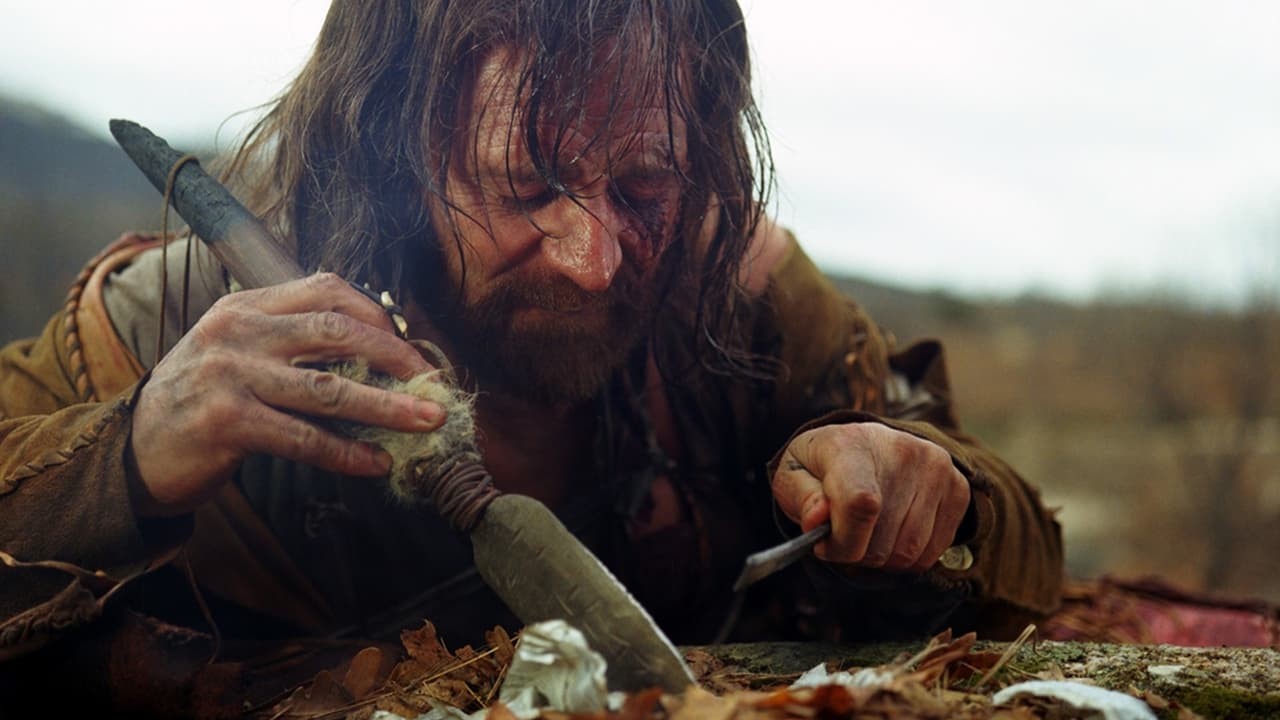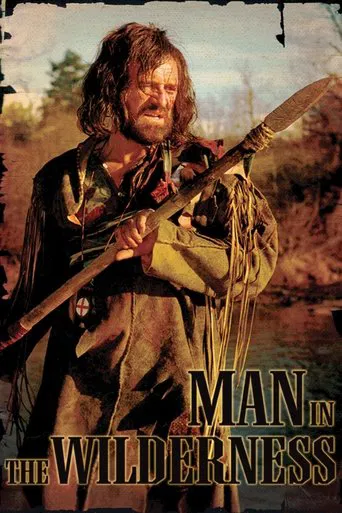

n my opinion it was a great movie with some interesting elements, even though having some plot holes and the ending probably was just too messy and crammed together, but still fun to watch and not your casual movie that is similar to all other ones.
... View MoreInstead, you get a movie that's enjoyable enough, but leaves you feeling like it could have been much, much more.
... View MoreThe story, direction, characters, and writing/dialogue is akin to taking a tranquilizer shot to the neck, but everything else was so well done.
... View MoreThere's a more than satisfactory amount of boom-boom in the movie's trim running time.
... View MoreThe remake of this year called "Revenant" has suddenly brought this original up to date, and a comparison is inevitable. Both have outstanding credits, "Revenant" above all for its amazing panoramic landscape cinematography, but this original weighs heavier. The acting is so much better, it is more humanly convincing, and although it's the same story it's a totally different story with a much more satisfactory and actually surprising end. Already from the start you are informed of all the facts of this adventurous expedition and its circumstances, and how vital it was for the men to get down to Missouri in time before winter - that race with time is the real thriller of the tale, which is totally absent from "Revenant", where instead you are buried in the tribulations of the deserted man, who is being constantly overloaded with new trials and hardships, as if the first was not enough, which is totally unnecessary exaggerations constructed only for effect. Here the narrative is more down to earth with moving details stressing the increasing humanity of the sufferer, such as his witnessing an Indian childbirth and his helping a rabbit with a broken leg - this is all more convincing and credible as a Robinsonade from real life, while "Revenant" in comparison is just mostly exaggerations. Here there is no nasty crook with intentional foul play, and an interesting spice to the human problem complex of the story is how the men actually suffer from having left Zach behind, even hallucinating about him for an extra bad conscience, while Zach himself is brought to maturity and insight by his memories in flashbacks. No bloody cruelty here, only the natural force of circumstances, which makes this film credibly positive in contrast to the remake. "Revenant" also has almost no music, only some moody chords now and then, while here you can enjoy a full and masterful score (by Johnny Harris - never saw his name before) which is perfectly suited to this grand epic human drama of survival and redemption, making a full vote well justified.
... View MoreThis movie was idiotic, ridiculous and hard to watch. The long drawn out scenes were just painful (and I enjoy slow movies), the 'survival' shots weren't realistic and the whole ending was just . strange. Indians sure do like being shot in these stupid movies don't they? I'm pretty sure they wouldn't just keep charging at men with rifles and cannon, lose scores of men but not actually really attack. Also pretty sure they had projectile weapons. And what was up with the stupid boat? The true story would have been far more interesting and there are other movies from this time frame that are way better I wouldn't bother watching this one.
... View MoreThis film gives a rather graphic idea of what it took for the real man Zach Bass is based upon, Hugh Glass, to survive and reach a distant outpost of European civilization, after being badly mauled by a mother grizzly and left for dead by his companions. As such, it ranks among the elite in unbelievable survival stories.The film begins following Glass's account quite closely,but gradually diverges somewhat as the story continues. Whereas Bass's companions are returning southward with the year's furs, Glass's historical mauling occurred while they were en route northwestward toward Ft. Henry, near the present MT-ND border.I wish the film had continued to follow Glass's account of his journey to Ft. Kiowa, in present central SD, being aided by Sioux at one point. The film fails to give credit to his subsequent perilous search for all those responsible for leaving him to die, some of whom had since left the expedition. This search for explanation and vengeance consumed about 8 months, much longer than his original epic journey, and often involving traveling long distances alone in winter over the northern plains, with the ever present dangers of hostile 'indians', wolves, starvation and freezing to death. During these journeys, he should have died at least twice, along with most of his companions, at the hands of the Arikaras, and was reported as apparently killed for the second time in less than a year. In a sense, in the film, this period was fused into Bass's epic journey, when he had to travel through snowstorms and snowfields before catching up with his companions. Glass's epic journey occurred from late Aug. to early Oct.Of all the men on the real expedition, Glass was probably uniquely qualified to have any chance of surviving his severe injuries. Although he was around 40, one of the oldest expedition members, he obviously had a very resilient physical constitution. He also probably had the most experience in this environment, having spent several years with the Pawnee after being captured, absorbing their survival skills. He also had incredible luck over the years in surviving situations that his companions often didn't survive. Finally, he was basically a loner, used to relying on himself to survive in this challenging environment.Perhaps I don't fully understand the symbolic nature of John Huston's role as Captain Henry.He seems like a Captain Ahab-like figure, riding on that keelboat on a wheeled carriage, being hauled overland by a team of mules and men. When the men object to the insanity of this operation, he replies that the boat is his only remaining symbol of command of this expedition. In place of Moby Dick, he has a paranoid fear of Bass(Richard Harris), based on his past experience of Bass having a seemingly supernatural ability to escape certain death. Thus, even though Fogarty and Lowrie swear they buried a dead Bass, taking his survival equipment, Henry is certain he is alive and seeking revenge, and periodically looks in the distance for him. Fogarty begins to share his paranoia, and shoots into the darkness around their camp, certain he saw Bass hiding. Of course, Bass does eventually appear. But, instead of being a nightmarish seeker of revenge, he inadvertently saves the others from an attack by a large party of Arikaras. Evidently, the Arikara chief is impressed by Bass's bravery and skill at surviving alone, and decides to spare him and, by extension, the other expedition members, whom he has not yet joined. Yet again impressed by the quirkiness of fate, Bass decides not to press his desire for revenge and, after retrieving his rifle, walks off into the unknown, perhaps having concluded that he is better off relying on himself for survival. Captain Henry seems to sympathize with this decision. If this interpretation is correct, Bass is basically like Jeff Webster in "The Far Country", who prefers to face adversity by himself and not get involved in other people's problems, having been betrayed by others in the past. Alternatively, one reviewer suggests that Bass was going home to see his small son. The first interpretation is more in keeping with Glass's subsequent life.Incidentally, the real Glass did not forgive Fitzgerald, whom he most blamed for his abandonment. Rather, he was refrained from killing this man only by the fact that he had since enlisted in the US army, with a capital penalty for his murder. He had earlier spared Jim Bridger because of his youth and the fact that Bridger had felt compelled to follow the lead of his older companion. Of course, Bridger would go on to become one of the grand old men of the West: one of the lucky few to survive all the hazards of this life.During his epic journey of rebirth, Bass witnesses a squaw brought into the woods, then left alone to give birth in the traditional squatting position. Later, her husband returns to help with the infant and take her back to the village. This brings back memories of Bass's deceased wife and his small child. But, I think he also identifies with her as someone who must also sometimes endure great pain and loneliness in order to fulfill her purpose in life. This helps give him more determination to survive his desperate situation.
... View MoreWhile I did enjoy seeing Richard Harris and John Houston, there really isn't much more to like about this movie.To its credit, I must say that it does a fine job illustrating the brutal relationship between man and nature that still exists today, though most are blissfully unaware.To its detriment, pretty much everything else about it. The story plods along at a naggingly slow pace, in which a string of unbelievable incidents play out before the mostly crippled protagonist. There are a few scenes in which live animals appear to have been mutilated for your viewing pleasure. The one with the buffalo being the most obvious, and in my opinion unforgivable.The movie is described as the protagonists journey towards revenge, and most of the reviews you will read here repeat that, but I don't feel that the movie itself really bothers to illustrate that he had revenge on his mind much at all.This movie could be of educational value to a generation that has no idea what life was like before now. But for everyone else, I feel it's a bit of a disappointment, considering it has earned such high ratings in the reviews.
... View More